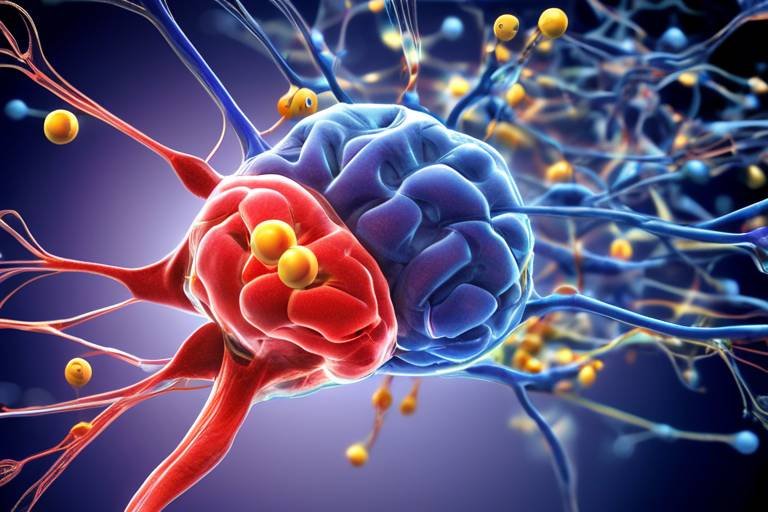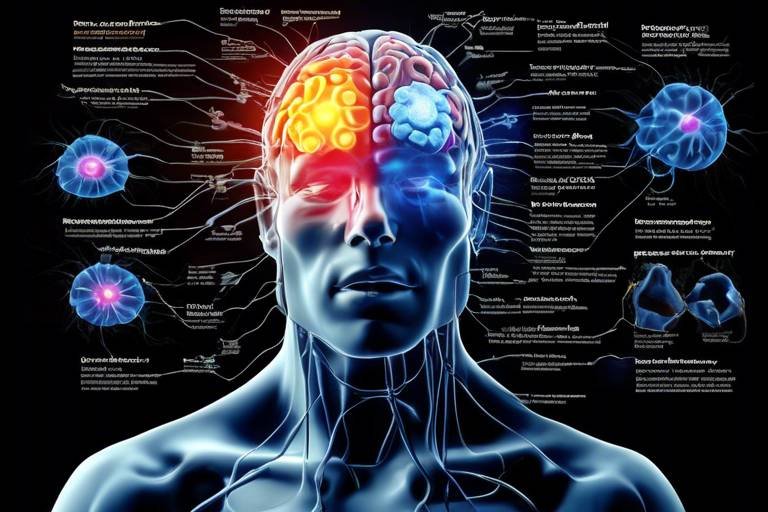The Biology of Neurotransmitters - Balancing Your Mood
The human brain is a complex and fascinating organ, often likened to a bustling city where countless interactions occur every second. In this vibrant metropolis, neurotransmitters serve as the essential chemical messengers that facilitate communication between neurons. These tiny molecules are crucial for regulating our emotions, behaviors, and overall mental health. Understanding the intricate relationship between neurotransmitters and mood can illuminate why we feel the way we do and how we can achieve emotional balance.
Neurotransmitters are specialized chemicals that transmit signals across synapses, the gaps between neurons. Imagine them as the postal service of the brain, delivering messages that tell our body how to respond to different situations. Each neurotransmitter has a unique role, influencing everything from our mood to our appetite and even our sleep patterns. For instance, when we experience joy, it's often due to the release of neurotransmitters like serotonin and dopamine, which create feelings of happiness and satisfaction. Conversely, when these levels drop, we may find ourselves feeling down or anxious.
Serotonin, often referred to as the feel-good neurotransmitter, is a key player in maintaining emotional stability. It helps regulate mood, sleep, and appetite, making it essential for our overall well-being. Think of serotonin as a warm blanket, wrapping you in comfort and security. When serotonin levels are balanced, we tend to feel more content and at ease. However, when there’s a disruption in serotonin production, it can lead to significant mood disorders, including depression and anxiety.
Identifying and addressing serotonin imbalances is crucial for effective mental health treatment. Symptoms of low serotonin can manifest in various ways, including persistent sadness, irritability, and sleep disturbances. In fact, studies suggest that many individuals suffering from depression have lower levels of serotonin in their brains. Understanding these imbalances can empower us to seek appropriate interventions, whether through lifestyle changes, therapy, or medication.
Several factors can contribute to low serotonin levels, impacting our mental health. These include:
- Genetics: Family history can play a significant role in neurotransmitter levels.
- Diet: A lack of essential nutrients, such as omega-3 fatty acids and vitamins, can hinder serotonin production.
- Lifestyle: Stress, lack of exercise, and insufficient sunlight exposure can negatively affect serotonin levels.
Fortunately, there are several ways to naturally boost serotonin levels. Simple lifestyle changes can lead to significant improvements in mood. Regular exercise, for instance, not only enhances physical health but also increases serotonin production. Additionally, a balanced diet rich in fruits, vegetables, and whole grains can provide the necessary nutrients for serotonin synthesis. Lastly, don't underestimate the power of sunlight; exposure to natural light can stimulate serotonin production, lifting your spirits and enhancing your mood.
While serotonin is vital for emotional health, it’s not the only neurotransmitter that matters. Others like dopamine and norepinephrine also play critical roles in regulating mood and mental well-being. Understanding how these neurotransmitters interact can provide a more comprehensive view of our emotional landscape.
Dopamine is often called the motivation molecule because it’s closely linked to feelings of pleasure, reward, and motivation. When you achieve a goal or experience something enjoyable, dopamine floods your brain, creating a sense of satisfaction. However, low levels of dopamine can lead to feelings of apathy, lack of motivation, and even depression. It’s like trying to drive a car with an empty gas tank—you simply won’t get very far.
Symptoms of low dopamine levels can include:
- Fatigue and lack of energy
- Difficulty concentrating
- Feelings of hopelessness
To enhance dopamine production, engage in activities that bring you joy and satisfaction. Whether it’s picking up a new hobby, spending time with friends, or even enjoying a favorite meal, these experiences can stimulate dopamine release, positively impacting your mood. Remember, it’s about finding what makes you feel alive and fulfilled!
Achieving a balance between neurotransmitters is essential for optimal mental health. Just like a well-tuned orchestra, each neurotransmitter must play its part harmoniously to create a beautiful symphony of emotions. Understanding how these chemical messengers interact can help us develop effective strategies for mood regulation. Whether through lifestyle changes, therapy, or medication, finding that balance can lead to a happier, healthier life.
1. What are the main neurotransmitters that affect mood?
The main neurotransmitters include serotonin, dopamine, and norepinephrine, each playing a unique role in regulating emotions and mood.
2. How can I boost my serotonin levels naturally?
You can boost serotonin levels through regular exercise, a healthy diet rich in nutrients, and by getting plenty of sunlight.
3. What are the symptoms of dopamine deficiency?
Symptoms can include fatigue, lack of motivation, and feelings of hopelessness.
4. Why is it important to maintain a balance of neurotransmitters?
A balance is crucial for optimal mental health, helping to regulate emotions and prevent mood disorders.

What Are Neurotransmitters?
Neurotransmitters are chemical messengers in the brain that play a pivotal role in transmitting signals between neurons. Imagine them as the postal workers of your brain, delivering important messages that dictate how you feel, think, and behave. These tiny molecules are crucial for various brain functions, influencing everything from your mood to your ability to focus.
To grasp their importance, consider this: without neurotransmitters, communication in the brain would come to a screeching halt. This could lead to a cascade of issues, including mood disorders and cognitive impairments. In essence, neurotransmitters are the unsung heroes of our emotional and mental well-being.
There are several types of neurotransmitters, each with its unique function. Here are a few key players:
- Serotonin: Often referred to as the feel-good neurotransmitter, it helps regulate mood, sleep, and appetite.
- Dopamine: Known for its role in pleasure and reward, dopamine is essential for motivation and enjoyment.
- Norepinephrine: This neurotransmitter is linked to the body's stress response and plays a role in focus and attention.
The balance of these neurotransmitters is crucial. When one is out of whack, it can lead to emotional upheaval. For instance, low serotonin levels are often associated with depression, while imbalances in dopamine can lead to apathy and lack of motivation. Understanding how these neurotransmitters work together can provide insight into mental health issues and their treatment.
In conclusion, neurotransmitters are more than just chemicals; they are the foundation of our emotional landscape. By understanding their roles and interactions, we can better navigate the complexities of our mental health.
- What are the main types of neurotransmitters? The main types include serotonin, dopamine, norepinephrine, GABA, and glutamate, each serving different functions in the brain.
- How do neurotransmitters affect mood? Neurotransmitters influence mood by regulating emotions, thoughts, and behaviors. An imbalance can lead to mood disorders.
- Can lifestyle changes affect neurotransmitter levels? Yes, lifestyle changes such as diet, exercise, and exposure to sunlight can naturally boost neurotransmitter levels.

The Role of Serotonin
Serotonin is often dubbed the feel-good neurotransmitter, and for good reason. This remarkable chemical messenger plays a pivotal role in regulating our mood, sleep, and appetite, acting as a natural mood stabilizer. Imagine serotonin as the sunshine that breaks through the clouds on a gloomy day; it has the ability to brighten our spirits and foster a sense of well-being. When serotonin levels are balanced, we feel more relaxed, focused, and emotionally stable. However, when these levels dip, it can be like a storm rolling in, leading to feelings of sadness, anxiety, and irritability.
To fully appreciate serotonin's role, it's essential to understand where it operates in the body. While it's primarily found in the brain, about 90% of the body's serotonin is actually located in the gut. This connection between our digestive health and mood is fascinating and underscores the importance of a healthy diet. Foods rich in tryptophan, an amino acid that serves as a precursor to serotonin, can help boost its production. Think of tryptophan as the building blocks that construct the serotonin skyscraper in our brains. Foods such as turkey, nuts, seeds, and bananas are excellent sources of this vital nutrient.
Moreover, serotonin is involved in various bodily functions beyond mood regulation. It influences our sleep patterns by helping to regulate the sleep-wake cycle, and it also plays a role in controlling appetite, making it crucial for maintaining a healthy weight. When we have adequate serotonin levels, we tend to feel satisfied after meals, which can prevent overeating. Conversely, low serotonin can lead to cravings and unhealthy eating habits, creating a vicious cycle of emotional eating.
So, how can we ensure our serotonin levels remain balanced? Here are a few strategies:
- Regular Exercise: Physical activity is a powerful way to boost serotonin. When we exercise, our bodies release endorphins and serotonin, which can enhance mood and reduce feelings of anxiety.
- Sunlight Exposure: Sunlight is a natural stimulant for serotonin production. Spending time outdoors or even sitting by a window can help elevate your mood.
- Mindfulness and Meditation: Practices that promote relaxation and mindfulness can also increase serotonin levels, helping to create a sense of calm and emotional stability.
In conclusion, serotonin is a key player in our emotional and physical health. By understanding its role and implementing lifestyle changes to support its production, we can take significant steps toward improving our overall well-being. Remember, a balanced mood is not just a luxury; it’s a vital component of a healthy life!

feel-good
This article explores the intricate relationship between neurotransmitters and mood regulation, highlighting their biological functions, imbalances, and potential effects on mental health.
Neurotransmitters are chemical messengers in the brain that transmit signals between neurons. Understanding their role is crucial for grasping how they influence our emotions and behavior.
Serotonin is often dubbed the neurotransmitter. It plays a significant role in mood regulation, sleep, and appetite, making it vital for emotional well-being and mental health.
An imbalance in serotonin levels can lead to mood disorders such as depression and anxiety. Identifying these imbalances is essential for effective treatment and management.
Several factors, including genetics, diet, and lifestyle, can contribute to low serotonin levels, impacting overall mental health and emotional stability.
Lifestyle changes, such as regular exercise, a balanced diet, and exposure to sunlight, can help naturally increase serotonin levels, promoting better mood and emotional health.
In addition to serotonin, other neurotransmitters like dopamine and norepinephrine also play critical roles in mood regulation and mental health.
Dopamine is crucial for motivation, pleasure, and reward. Understanding its function can help explain its influence on mood and behavior.
Low dopamine levels can lead to feelings of apathy, lack of motivation, and even depression, highlighting the importance of maintaining balanced neurotransmitter levels.
Engaging in activities that promote joy and satisfaction, such as hobbies and social interactions, can help enhance dopamine production, positively impacting mood.
Achieving a balance between neurotransmitters is essential for optimal mental health. Understanding how they interact can aid in developing effective strategies for mood regulation.
When we talk about the neurotransmitter, serotonin, it's like discussing the sunshine on a cloudy day. This remarkable chemical not only lifts our spirits but also plays a pivotal role in how we experience life. Imagine your brain as a bustling city, where serotonin acts as a friendly traffic officer, ensuring that the signals between neurons flow smoothly. When serotonin levels are balanced, we often feel more relaxed, happy, and ready to tackle the day. However, when those levels dip, it can feel like a traffic jam in our minds, leading to feelings of sadness or anxiety.
But what exactly causes these serotonin fluctuations? Many factors come into play:
- Genetics: Some people are genetically predisposed to lower serotonin levels.
- Diet: Foods rich in tryptophan, like turkey and bananas, can help boost serotonin production.
- Lifestyle: Regular physical activity and adequate sleep are crucial for maintaining serotonin balance.
To maintain that feel-good vibe, consider incorporating activities that can naturally enhance serotonin levels. Think of it as nurturing a garden; with the right care, it can flourish. Simple steps like getting sunlight, engaging in physical activities, and practicing mindfulness can significantly impact your serotonin levels.
In conclusion, understanding the role of serotonin as the feel-good neurotransmitter is essential for anyone looking to improve their mood and mental health. By recognizing the signs of imbalance and taking proactive steps, we can cultivate a happier, healthier mindset.
Neurotransmitters are chemical messengers that transmit signals between neurons in the brain, influencing various functions including mood, behavior, and cognitive processes.
Serotonin helps regulate mood, sleep, and appetite. Balanced serotonin levels contribute to feelings of happiness and emotional stability.
Factors such as genetics, poor diet, lack of exercise, and stress can lead to serotonin imbalances, potentially resulting in mood disorders.
Engaging in regular exercise, maintaining a healthy diet, getting enough sunlight, and practicing mindfulness techniques can naturally enhance serotonin levels.

neurotransmitter. It plays a significant role in mood regulation, sleep, and appetite, making it vital for emotional well-being and mental health.
This article explores the intricate relationship between neurotransmitters and mood regulation, highlighting their biological functions, imbalances, and potential effects on mental health.
Neurotransmitters are chemical messengers in the brain that transmit signals between neurons. Understanding their role is crucial for grasping how they influence our emotions and behavior.
Serotonin is often dubbed the feel-good neurotransmitter. It plays a significant role in mood regulation, sleep, and appetite, making it vital for emotional well-being and mental health. Imagine serotonin as the sunshine that breaks through the clouds on a gloomy day; it brightens our mood, helps us sleep soundly, and keeps our appetite in check. When serotonin levels are balanced, we tend to feel more optimistic, energized, and ready to tackle the day. Conversely, when serotonin is low, it can feel like the clouds have rolled back in, leading to feelings of sadness, anxiety, and even disruptions in our sleep patterns.
An imbalance in serotonin levels can lead to mood disorders such as depression and anxiety. Identifying these imbalances is essential for effective treatment and management. When serotonin levels dip, it's like a car running low on fuel; it simply can't function at its best. This is why understanding the symptoms of low serotonin is crucial for anyone looking to improve their mental health.
Several factors, including genetics, diet, and lifestyle, can contribute to low serotonin levels, impacting overall mental health and emotional stability. For instance, a diet lacking in essential nutrients, particularly those that aid serotonin production, can lead to deficiencies. Similarly, a sedentary lifestyle can prevent the body from producing enough serotonin, leaving you feeling sluggish and down.
Lifestyle changes, such as regular exercise, a balanced diet, and exposure to sunlight, can help naturally increase serotonin levels, promoting better mood and emotional health. Think of it as watering a plant; just as plants need water and sunlight to thrive, our brains need certain activities and nutrients to produce serotonin effectively. Incorporating foods rich in tryptophan, such as turkey, eggs, and nuts, can significantly help in boosting serotonin levels.
In addition to serotonin, other neurotransmitters like dopamine and norepinephrine also play critical roles in mood regulation and mental health.
Dopamine is crucial for motivation, pleasure, and reward. Understanding its function can help explain its influence on mood and behavior. It's like the fuel that powers your engine; without it, you might find yourself stuck in neutral, unable to move forward.
Low dopamine levels can lead to feelings of apathy, lack of motivation, and even depression, highlighting the importance of maintaining balanced neurotransmitter levels. When dopamine is low, it’s as if the color has been drained from your life; everything feels dull and uninviting.
Engaging in activities that promote joy and satisfaction, such as hobbies and social interactions, can help enhance dopamine production, positively impacting mood. Think of it as recharging your battery; the more you connect with what makes you happy, the more energized you'll feel.
Achieving a balance between neurotransmitters is essential for optimal mental health. Understanding how they interact can aid in developing effective strategies for mood regulation. Just like a well-tuned orchestra, each neurotransmitter needs to play its part harmoniously to create a beautiful symphony of emotional well-being.
- What are the main functions of neurotransmitters?
Neurotransmitters are responsible for transmitting signals in the brain, influencing mood, sleep, appetite, and overall mental health. - How can I naturally boost serotonin levels?
Engaging in regular exercise, maintaining a balanced diet rich in tryptophan, and getting enough sunlight can help increase serotonin levels. - What are the symptoms of dopamine deficiency?
Low dopamine levels can lead to apathy, lack of motivation, and feelings of depression. - Why is it important to maintain a balance of neurotransmitters?
A balance of neurotransmitters is crucial for optimal mental health, helping to regulate mood and emotional well-being.

Serotonin Imbalances
When we talk about , we’re diving into a topic that affects millions of people globally. Imagine your brain as a finely tuned orchestra, where each neurotransmitter plays its part to create a harmonious symphony of emotions and behaviors. Now, picture one of those instruments—serotonin—playing out of tune. This dissonance can lead to a range of emotional troubles, primarily mood disorders like depression and anxiety.
Serotonin is not just about feeling good; it regulates various functions in the body, including sleep, appetite, and even digestion. When serotonin levels drop, it can lead to a cascade of negative effects. For instance, studies have shown that low serotonin levels are closely linked to conditions such as:
- Depression: A persistent feeling of sadness, hopelessness, and a lack of interest in life.
- Anxiety: Increased feelings of worry and fear that can interfere with daily activities.
- Obsessive-Compulsive Disorder (OCD): Characterized by unwanted repetitive thoughts and behaviors.
Identifying serotonin imbalances is crucial for effective treatment. The symptoms can vary widely from person to person, making it essential to pay attention to both physical and emotional signs. For example, someone might experience:
| Symptom | Description |
|---|---|
| Low Mood | A pervasive feeling of sadness or emptiness. |
| Sleep Disturbances | Insomnia or excessive sleeping can be a sign of imbalance. |
| Changes in Appetite | Either a significant increase or decrease in appetite can indicate issues. |
Understanding these symptoms is the first step toward seeking help. It’s like being a detective in your own life, piecing together clues to understand what’s happening in your mind and body. Once you identify a potential serotonin imbalance, the next step is to explore its causes, which can range from genetics and diet to lifestyle choices. The good news? Many of these factors can be managed or altered, paving the way for a more balanced emotional state.
Ultimately, recognizing serotonin imbalances is about taking control of your mental health. Just like a car needs fuel to run smoothly, your brain requires the right balance of neurotransmitters to function optimally. By understanding the role of serotonin and its impact on your mood, you can take proactive steps toward achieving emotional stability and overall well-being.
- What are the symptoms of serotonin imbalance? Symptoms can include low mood, anxiety, sleep disturbances, and changes in appetite.
- How can I boost my serotonin levels naturally? Regular exercise, a balanced diet rich in omega-3 fatty acids, and getting enough sunlight can help.
- Can serotonin levels be tested? While there is no definitive test for serotonin levels, healthcare providers can assess symptoms and recommend treatments.

Causes of Serotonin Deficiency
Understanding the is like piecing together a complex puzzle; each factor plays a crucial role in the overall picture of our mental health. Various elements can contribute to low serotonin levels, impacting our emotional stability and well-being. One significant factor is genetics. Some individuals may have a genetic predisposition that affects serotonin production or its receptor sensitivity, making them more vulnerable to mood disorders.
Another vital aspect to consider is diet. Our body requires specific nutrients to synthesize serotonin effectively. For instance, the amino acid tryptophan is a precursor to serotonin and is found in foods such as turkey, eggs, and nuts. A diet lacking in these essential nutrients can lead to decreased serotonin levels. Furthermore, excessive consumption of processed foods and sugars can negatively influence serotonin production, creating a vicious cycle of poor dietary choices and mood fluctuations.
Lifestyle factors also play a significant role in serotonin levels. Chronic stress can deplete serotonin, as the body's response to stress often involves hormonal changes that interfere with neurotransmitter balance. Additionally, a sedentary lifestyle can hinder serotonin production. Regular physical activity has been shown to boost serotonin levels, so a lack of exercise can contribute to deficiencies.
Moreover, exposure to sunlight is essential for serotonin synthesis. During the winter months or in regions with limited sunlight, many people experience a drop in serotonin levels, which can lead to seasonal affective disorder (SAD). This condition highlights the importance of light in regulating mood and serotonin production.
Lastly, certain medical conditions and medications can impact serotonin levels. For example, conditions such as chronic pain or hormonal imbalances can affect neurotransmitter function. Additionally, some medications, particularly those that influence serotonin reuptake, can alter its availability in the brain, leading to potential deficiencies.
In summary, the causes of serotonin deficiency are multifaceted, involving a combination of genetic, dietary, lifestyle, and environmental factors. Addressing these issues holistically can help restore balance and improve mental health.

Boosting Serotonin Naturally
When it comes to enhancing your mood, boosting serotonin levels naturally can be a game-changer. Think of serotonin as the sunshine in your brain, illuminating your thoughts and feelings, and helping you navigate through the ups and downs of life. So, how can we invite more of this feel-good neurotransmitter into our lives? The answer lies in a combination of lifestyle changes and mindful practices.
First off, let’s talk about exercise. Engaging in regular physical activity is one of the most effective ways to increase serotonin levels. When you exercise, your body releases endorphins, which are natural mood lifters. Whether it’s a brisk walk, a dance class, or hitting the gym, finding an activity you enjoy can make a world of difference. Just imagine it as a natural high that not only strengthens your body but also elevates your mood!
Next up is your diet. What you eat plays a significant role in your brain chemistry. Foods rich in tryptophan, an amino acid that is a precursor to serotonin, can help boost its production. Incorporating foods like turkey, nuts, seeds, tofu, and bananas into your meals can be beneficial. Picture your plate as a canvas, where each colorful food item contributes to a masterpiece of mental well-being.
Another key player in the serotonin game is sunlight. Exposure to natural light helps your body produce more serotonin. Have you ever noticed how a sunny day can lift your spirits? That’s not just a coincidence! Aim for at least 15-30 minutes of sunlight exposure each day. If you live in a region with long winters, consider using a light therapy box to mimic natural sunlight during those gloomy months.
Lastly, don’t underestimate the power of mindfulness and relaxation techniques. Practices such as meditation, yoga, or even deep breathing exercises can significantly impact your serotonin levels. These activities help reduce stress and anxiety, creating a fertile ground for serotonin production. Imagine your mind as a garden; with regular care and attention, you can cultivate a flourishing environment for positivity and calm.
In summary, boosting serotonin naturally is all about making mindful choices that promote physical health and emotional stability. By incorporating regular exercise, a balanced diet rich in tryptophan, sunlight exposure, and relaxation techniques, you can create a holistic approach to enhancing your mood. It’s like building a solid foundation for your emotional well-being, allowing you to weather life's storms with a brighter outlook.
- What are some quick ways to boost serotonin? Engaging in physical activity, spending time in nature, and consuming foods high in tryptophan can quickly elevate serotonin levels.
- Can supplements help increase serotonin? Some supplements, like 5-HTP and St. John's Wort, may help boost serotonin levels, but it’s essential to consult with a healthcare professional before starting any supplementation.
- How long does it take to feel the effects of increased serotonin? While some individuals may notice changes in mood relatively quickly, for others, it may take several weeks of consistent lifestyle changes to experience significant improvements.

Other Key Neurotransmitters
While serotonin often steals the spotlight in discussions about mood regulation, it's important to recognize that our emotional landscape is shaped by a variety of neurotransmitters. Dopamine and norepinephrine are two key players that significantly impact our mood, motivation, and overall mental health. Just like a well-orchestrated symphony, these neurotransmitters must work in harmony to create a balanced emotional state.
Dopamine, often referred to as the "feel-good" neurotransmitter, is crucial for our experience of pleasure and reward. It fuels our motivation and drives us to pursue goals. Imagine dopamine as the cheerleader of your brain, encouraging you to chase after what makes you happy. When dopamine levels are optimal, you feel energized and engaged with life. However, when these levels drop, you might experience a lack of interest in activities that once excited you, leading to feelings of apathy or even depression.
On the other hand, norepinephrine plays a vital role in our body's stress response. It helps regulate alertness, attention, and energy levels. Think of norepinephrine as the alarm clock of your brain, waking you up and keeping you focused on tasks at hand. When you're faced with stress, norepinephrine spikes to help you react quickly and effectively. However, chronic stress can lead to an overproduction of norepinephrine, which may contribute to anxiety and other mood disorders.
To better understand the functions and interactions of these neurotransmitters, let's take a look at the table below:
| Neurotransmitter | Primary Function | Impact of Imbalance |
|---|---|---|
| Dopamine | Motivation, pleasure, reward | Apathy, lack of motivation, depression |
| Norepinephrine | Alertness, attention, stress response | Anxiety, hyperactivity, mood swings |
By recognizing the roles of these neurotransmitters, we can better appreciate the complexity of our emotional health. It's not just about increasing serotonin levels; we must also consider how dopamine and norepinephrine contribute to our overall well-being. Engaging in activities that stimulate dopamine production, such as pursuing hobbies or socializing, can help lift our spirits. Similarly, practicing stress management techniques can help regulate norepinephrine levels, promoting a sense of calm and focus.
In essence, understanding the interplay between these neurotransmitters can empower us to take charge of our mental health. By making informed lifestyle choices and seeking balance, we can cultivate a more positive emotional state.
- What are neurotransmitters?
Neurotransmitters are chemical messengers in the brain that transmit signals between neurons, influencing our emotions and behaviors.
- How does serotonin affect mood?
Serotonin plays a significant role in mood regulation, sleep, and appetite, making it crucial for emotional well-being.
- What can I do to boost my serotonin levels?
Regular exercise, a balanced diet, and exposure to sunlight are effective ways to naturally increase serotonin levels.
- What happens if I have low dopamine levels?
Low dopamine levels can lead to feelings of apathy, lack of motivation, and depression.
- How can I enhance dopamine production?
Engaging in enjoyable activities, such as hobbies and social interactions, can enhance dopamine production.

Dopamine and Its Impact
Dopamine is often referred to as the “feel-good” neurotransmitter, and for good reason. This remarkable chemical plays a pivotal role in our brain's reward system, influencing everything from our mood to our motivation. Have you ever felt that rush of excitement when achieving a goal or indulging in a favorite activity? That’s dopamine at work! It’s like a little cheerleader in your brain, celebrating your accomplishments and encouraging you to keep pushing forward.
But what happens when dopamine levels dip? The effects can be quite profound. Low dopamine levels are linked to a range of symptoms that can significantly impact our daily lives. Picture this: you wake up one morning feeling completely unmotivated, as if the weight of the world is resting on your shoulders. You might find yourself struggling to enjoy activities you once loved, feeling apathetic, or even experiencing a sense of hopelessness. These feelings can be attributed to a deficiency in dopamine, underscoring the importance of maintaining balanced neurotransmitter levels.
So, how does dopamine actually influence our mood and behavior? Here are some key points to consider:
- Motivation: Dopamine drives us to pursue goals and rewards, acting as a motivator that propels us towards action.
- Pleasure: It’s involved in the brain's reward circuitry, which means it enhances feelings of pleasure and satisfaction when we achieve something.
- Learning: Dopamine plays a crucial role in reinforcement learning, helping us remember behaviors that lead to positive outcomes.
Given its importance, it’s essential to take steps to enhance dopamine production naturally. Engaging in activities that bring joy and satisfaction can significantly boost dopamine levels. Think of hobbies that ignite your passion, social interactions that make you laugh, or even simple pleasures like enjoying a favorite meal. The more you immerse yourself in activities that lift your spirits, the more dopamine your brain produces, creating a positive feedback loop that enhances your mood.
In conclusion, understanding dopamine's impact on our mental health is crucial. By recognizing the signs of dopamine deficiency and actively seeking ways to boost its levels, we can take proactive steps towards better emotional well-being. Remember, a balanced brain is a happy brain!
1. What are the symptoms of low dopamine levels?
Common symptoms include lack of motivation, feelings of apathy, decreased pleasure in activities, and even depression.
2. How can I naturally increase my dopamine levels?
Engaging in enjoyable activities, exercising regularly, maintaining a balanced diet, and getting enough sleep can all help boost dopamine production.
3. Can dopamine supplements help?
While some supplements claim to boost dopamine, it's essential to consult with a healthcare professional before starting any new supplement regimen.
4. Is there a link between dopamine and addiction?
Yes, dopamine plays a significant role in the brain’s reward system, and substances that increase dopamine can contribute to addictive behaviors.

Dopamine Deficiency Symptoms
Dopamine deficiency can manifest in various ways, often leaving individuals feeling as if they're navigating through a fog. Imagine trying to enjoy a beautiful day at the park, but instead, you’re stuck in a heavy cloud; that’s what low dopamine levels can feel like. The symptoms of dopamine deficiency can significantly impact one’s daily life, affecting everything from motivation to mood. Some common signs include:
- Lack of Motivation: One of the most noticeable symptoms is a profound sense of apathy. Tasks that once sparked joy or interest may seem daunting or unimportant.
- Low Energy Levels: Individuals may find themselves feeling tired and lethargic, even after a full night’s sleep.
- Depression: Persistent feelings of sadness or hopelessness can arise, often coupled with a diminished sense of self-worth.
- Difficulty Concentrating: A foggy mind can make focusing on tasks challenging, leading to decreased productivity.
- Decreased Pleasure: Activities that used to bring joy, whether it’s hanging out with friends or indulging in a favorite hobby, may suddenly feel lackluster.
In addition to these symptoms, dopamine deficiency can also lead to physical manifestations. For example, individuals might experience changes in sleep patterns or appetite, as dopamine plays a crucial role in regulating these functions. A lack of dopamine can lead to insomnia or excessive sleeping, while appetite changes might result in overeating or loss of interest in food.
Moreover, the impact of low dopamine levels can be far-reaching. It can affect relationships, work performance, and overall quality of life. Imagine trying to climb a mountain but feeling as if you’re carrying an extra hundred pounds on your back; that’s what it’s like to deal with the symptoms of dopamine deficiency. Understanding these symptoms is not just about recognizing them; it’s about taking proactive steps to address the underlying issues. If you or someone you know is experiencing these symptoms, it’s essential to seek help and explore potential treatments.
- What causes dopamine deficiency? Dopamine deficiency can be caused by a variety of factors, including genetics, poor diet, lack of exercise, and chronic stress.
- How can I boost my dopamine levels? Engaging in regular physical activity, eating a balanced diet rich in tyrosine, and practicing mindfulness can help naturally boost dopamine levels.
- Can dopamine deficiency lead to serious mental health issues? Yes, prolonged dopamine deficiency can contribute to serious mental health disorders, including depression and anxiety.
- Is medication necessary for dopamine deficiency? While medication can be beneficial, lifestyle changes and natural remedies can also play a significant role in managing symptoms.

Enhancing Dopamine Production
Dopamine is often referred to as the "feel-good" neurotransmitter, and for good reason! It plays a pivotal role in how we experience pleasure, motivation, and reward. If you’ve ever felt that rush of excitement after achieving a goal or indulging in something you love, you can thank dopamine for that exhilarating feeling. But what happens when our dopamine levels dip? It can lead to feelings of apathy, lack of motivation, and even depression. So, how can we naturally enhance dopamine production and keep our spirits high? Well, it’s all about making some intentional lifestyle choices!
First and foremost, engaging in regular physical activity is one of the most effective ways to boost dopamine levels. Exercise doesn’t just improve your physical health; it also releases a cascade of neurotransmitters that elevate your mood. Whether it’s a brisk walk, a dance class, or a vigorous workout at the gym, moving your body can significantly increase dopamine production. Think of it as giving your brain a natural jolt of happiness!
Nutrition also plays a crucial role in dopamine synthesis. Foods rich in the amino acid tyrosine, which is a precursor to dopamine, can help. Incorporating items such as:
- Bananas
- Avocados
- Eggs
- Chicken
- Fish
- Nuts and seeds
into your diet can provide the building blocks your body needs to produce more dopamine. Additionally, omega-3 fatty acids found in fish like salmon and walnuts have been shown to enhance dopamine levels, making them a great addition to your meals.
Another surprising way to boost dopamine is through social interactions. Spending time with friends, family, or even pets can trigger dopamine release. It’s like having a little party in your brain! Engaging in conversations, sharing laughter, or simply being in the company of loved ones can enhance your mood and increase those feel-good neurotransmitters.
Don’t underestimate the power of mindfulness and meditation either! Practicing mindfulness can help reduce stress and anxiety, which in turn can lead to an increase in dopamine levels. Taking time to reflect, breathe, and center yourself can create a positive feedback loop in your brain, enhancing your overall emotional well-being.
Lastly, consider setting and achieving small goals. Dopamine is released when you accomplish something, no matter how small. It’s like a reward system for your brain! Whether it’s finishing a book, organizing a room, or completing a task at work, every little achievement can give you a dopamine boost. So, celebrate those small wins!
In summary, enhancing dopamine production is about creating a lifestyle that promotes physical activity, balanced nutrition, social connections, mindfulness, and goal achievement. By integrating these practices into your daily routine, you can significantly improve your mood and overall mental health. Remember, it’s all about finding what works for you and making those small changes that can lead to big improvements in your emotional well-being!
1. What are the signs of low dopamine levels?
Common signs include lack of motivation, feelings of apathy, and decreased pleasure in activities that once brought joy.
2. Can diet alone improve dopamine levels?
While diet plays a significant role, combining it with regular exercise and social interactions can yield the best results.
3. How long does it take to see improvements in mood with these changes?
Improvements can often be felt within a few weeks, but consistency is key to maintaining elevated dopamine levels.
4. Are there supplements that can help boost dopamine?
Yes, certain supplements like L-Tyrosine and Omega-3 fatty acids may support dopamine production, but it’s best to consult with a healthcare professional before starting any new supplement.

The Importance of Balance
When it comes to mental health, achieving a balance between neurotransmitters is not just important; it's absolutely essential. Think of neurotransmitters as the orchestra of your brain, each playing a unique role in creating the symphony of your emotions and behaviors. If one instrument is out of tune, the entire performance can suffer, leading to feelings of unease, anxiety, or even depression. This balance is crucial because neurotransmitters like serotonin, dopamine, and norepinephrine work together to regulate our mood, motivation, and overall mental well-being.
Imagine your brain as a well-balanced scale. On one side, you have neurotransmitters that promote happiness and motivation, while on the other side, you have those that can lead to feelings of sadness or apathy. If one side becomes too heavy, the scale tips, and this imbalance can manifest in various ways, such as mood swings, fatigue, or even mental health disorders. Understanding this balance can help you recognize when things are off-kilter, allowing you to take proactive steps to restore harmony.
To illustrate the importance of this balance, consider the following table that outlines the functions and effects of key neurotransmitters:
| Neurotransmitter | Function | Effects of Imbalance |
|---|---|---|
| Serotonin | Mood regulation, sleep, appetite | Depression, anxiety, insomnia |
| Dopamine | Motivation, pleasure, reward | Apathy, lack of motivation, depression |
| Norepinephrine | Stress response, focus, energy | Fatigue, lack of focus, anxiety |
It's fascinating to note that lifestyle choices play a significant role in maintaining this balance. For instance, regular physical activity can enhance the production of serotonin and dopamine, helping to keep your mood elevated. Similarly, a nutrient-rich diet can provide the building blocks necessary for neurotransmitter synthesis, while social interactions and engaging hobbies can stimulate their release. However, when stress levels rise or unhealthy habits take over, the balance can shift, leading to a downward spiral of mental health challenges.
In essence, keeping neurotransmitters in balance is like tending to a garden. It requires attention, care, and the right conditions to flourish. By understanding how these chemical messengers interact and influence our emotions, we can take actionable steps to cultivate a healthier mind. Whether it’s through dietary changes, exercise, or mindfulness practices, there are plenty of ways to nurture this balance. So, the next time you feel a bit off, remember that your neurotransmitters might just need a little TLC!
- What are neurotransmitters? Neurotransmitters are chemical messengers in the brain that transmit signals between neurons, playing a crucial role in regulating mood and behavior.
- How do imbalances in neurotransmitters affect mental health? Imbalances can lead to mood disorders such as depression and anxiety, affecting overall emotional well-being.
- Can lifestyle changes help balance neurotransmitters? Yes, activities like regular exercise, a healthy diet, and social interactions can naturally boost neurotransmitter levels.
- What are some natural ways to increase serotonin? Engaging in physical activity, spending time in sunlight, and eating foods rich in tryptophan can help increase serotonin levels.
Frequently Asked Questions
- What are neurotransmitters and why are they important?
Neurotransmitters are chemical messengers in the brain that play a crucial role in transmitting signals between neurons. They are essential for regulating our mood, emotions, and behavior. Understanding their function helps us grasp how they influence our mental health.
- How does serotonin affect my mood?
Serotonin is often referred to as the "feel-good" neurotransmitter. It significantly impacts mood regulation, sleep, and appetite. When serotonin levels are balanced, we tend to feel happier and more stable emotionally. An imbalance can lead to mood disorders like depression and anxiety.
- What causes serotonin deficiency?
Several factors can contribute to low serotonin levels, including genetics, poor diet, and lifestyle choices. Stress and lack of sunlight exposure can also play a role. Identifying these factors is essential for addressing mood issues effectively.
- Can I boost my serotonin levels naturally?
Absolutely! You can naturally increase serotonin levels through lifestyle changes such as regular exercise, maintaining a balanced diet rich in omega-3 fatty acids, and getting enough sunlight. These changes can promote better mood and emotional health.
- What is the role of dopamine in mood regulation?
Dopamine is a key neurotransmitter associated with motivation, pleasure, and reward. It plays a significant role in how we experience joy and satisfaction. Understanding its function can help us appreciate its influence on our mood and behavior.
- What are the symptoms of low dopamine levels?
Low dopamine levels can manifest as feelings of apathy, lack of motivation, and even depression. Recognizing these symptoms is crucial for understanding the importance of maintaining balanced neurotransmitter levels for overall mental well-being.
- How can I enhance dopamine production?
Engaging in activities that bring you joy, such as pursuing hobbies, spending time with friends, or practicing mindfulness, can help enhance dopamine production. These positive experiences can significantly improve your mood and overall mental health.
- Why is it important to maintain a balance of neurotransmitters?
Achieving a balance between neurotransmitters is essential for optimal mental health. An imbalance can lead to mood disorders and affect emotional stability. Understanding how neurotransmitters interact can help in developing effective strategies for mood regulation.



















